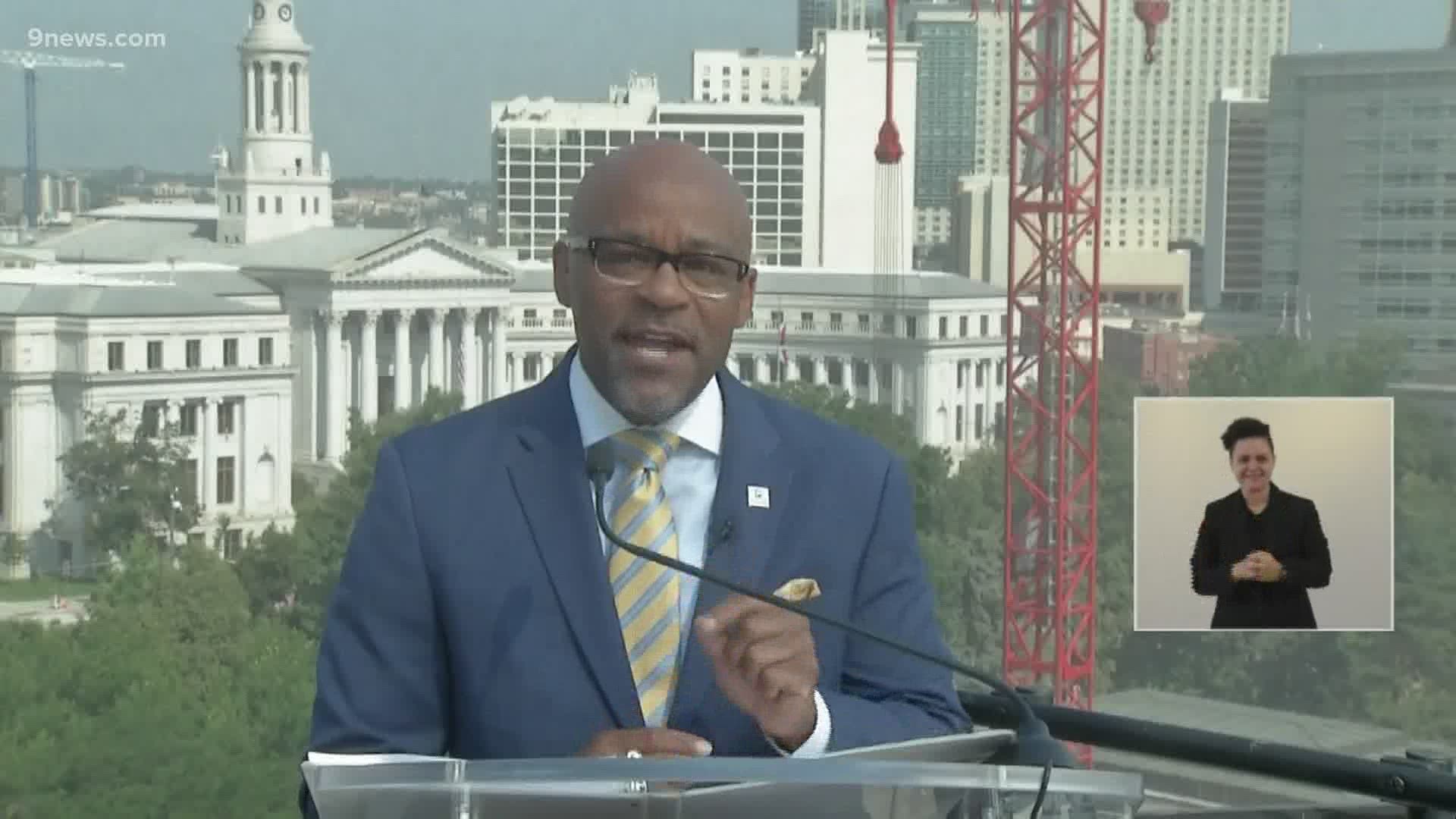DENVER — Mayor Michael Hancock (D-Denver) focused on continuing the fight against the COVID-19 pandemic, public safety, and housing and homelessness recovery during the 2021 State of the City address on Monday morning.
Hancock said the city is allocating an additional $500,000 to bring COVID vaccines to neighborhoods and communities with low rates.
"Without question, the past 16 months have been a time of loss, hardship and change. The stress of folks losing their jobs; of losing loved ones or friends; of losing a sense of belonging and connectedness after months and months of staying at home – has taxed all of us," Hancock said. "Unfortunately, that stress may be with us for a while longer. As much as we might like to think COVID is over, it’s not."
Hancock said that Denver and other cities nationwide need stronger federal support to combat homelessness, and is proposing using $28 million in federal funding from the American Rescue Plan into the city's Affording Housing Fund, as well as the creation of a specialized team that prioritizes the approval affordable housing projects.
"Even before the pandemic, homeless encampments were appearing in cities across the country in numbers not seen in almost a century," he said. "You have my word – we are going to continue to deploy every tool available, with a goal of lifting thousands of people out of homelessness over the next two years, including those who are living on our streets in the most unsafe and unhealthy of conditions."
The recent spike in violent crime was another focus, where Hancock said the problem in Denver specifically was being compounded by the quick release of violent criminals from custody who go on to commit more crimes.
"This must be corrected," he said. "There must be a balance between reform that keeps low-level non-violent folks from going to jail in the first place, and our residents’ safety. One cannot come at the expense of the other."
He said the city is specifically prioritizing a new Youth Violence Prevention initiative and the STAR van community response pilot program, which has a Mental Health Center of Denver clinician and a Denver Health paramedic respond to certain calls instead of uniformed officers.
Hancock said there was not a single call for backup from a uniformed officer over 1,300 calls the STAR program responded to in its first year, and said the city is investing an additional $1 million to expand the program.
As the city recovers from the pandemic economically, the mayor also said he will be submitting a $450 million infrastructure bond to the Denver City Council that is projected to create 7,500 jobs, $483 million in worker wages and benefits and $1 billion in economic benefits in construction alone.
"Building a new state-of-the-art arena, and the new events it will attract, will create year-round jobs and provide funding for community programs and projects important to the well-being of the surrounding neighborhoods," he said. "Bond-funded transportation projects will support new jobs and improve mobility, and other projects will strengthen our cultural institutions, libraries and parks-and-rec facilities."
He is also proposing using $21 million in funding from the American Rescue Plan to help businesses, non-profits and neighborhood organizations.
"The state of our city is resilient," Hancock said. "The immediate challenges of the moment will try to force us to keep our heads down. But it’s time, Denver, to lift our heads and see a better tomorrow. To build a better tomorrow. The resiliency that defines us, the Denver spirit that welcomes challenges and creates opportunities, is back and stronger than ever before – that is our path forward."
Last month, Hancock detailed next steps in the city's housing and homelessness recovery strategy by announcing an effort by the city to acquire and rehabilitate a number of hotels and motels to help people experiencing homelessness enter into housing.
“These acquisitions will deliver options for people in need much quicker than the traditional housing development," Hancock said.
Hancock said the pandemic showed that 24-hour shelters can be successful in the city and announced plans to expand safe outdoor spaces in Denver. Safe outdoor spaces are temporary, managed campsites approved by the city that were created in 2020 to serve people experiencing homelessness during the pandemic.
The Denver Police Department and Hancock’s office are collaborating to address crime in the problem neighborhoods. Denver Police Chief Paul Pazen says the areas chosen are historically persistent locations for violent crimes.
Five areas across the city have been identified as Denver’s crime hot spots. Police say these areas make up 26% of murders and nearly 50% of shootings.
“Our approach is collaborative – crime prevention initiative is working with other city agencies,” Denver Police Chief Paul Pazen said. “We identified five hotspots. 1.56% of the landmass that makes up Denver that accounts for 26% of the homicides and 49% of the shootings.”
> Top stories from 9NEWS curated daily just for you! Sign up for the 9NEWSLETTER right now to get can’t-miss stories, Next and Broncos content, weather and more delivered right to your inbox.
SUGGESTED VIDEOS: Politics
MORE WAYS TO GET 9NEWS
Subscribe to our daily 9NEWSLETTER for top stories from 9NEWS curated daily just for you. Get content and information right now for can’t-miss stories, Next and Broncos content, weather and more delivered right to your inbox.
DOWNLOAD THE 9NEWS APP
iTunes: http://on9news.tv/itunes
Google Play: http://on9news.tv/1lWnC5n
HOW TO ADD THE 9NEWS APP TO YOUR STREAMING DEVICE
ROKU: add the channel from the ROKU store or by searching for KUSA.
For both Apple TV and Fire TV, search for "9news" to find the free app to add to your account. Another option for Fire TV is to have the app delivered directly to your Fire TV through Amazon.

